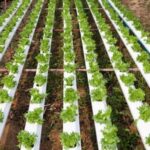In this article, we will explore the process of composting cow manure, its nutritional benefits for vegetable growth, and the safety considerations when using it in gardens. As more gardeners seek environmentally-friendly and organic options for their crops, the use of composted cow manure has gained popularity due to its numerous benefits for soil health.
Composted cow manure is a natural soil amendment that is created through the decomposition of cow dung with organic materials. This process not only helps in recycling waste but also enhances the nutrient content of the resulting compost. With the increasing emphasis on sustainable gardening practices, many growers have turned to using composted cow manure as a way to improve soil structure and promote healthier plant growth in their vegetable gardens.
In this article, we will delve into the process of composting cow manure and discuss how proper composting is essential for ensuring its safety in vegetable gardens. Additionally, we will also highlight the nutritional benefits of using composted cow manure as well as address any concerns about its safety and environmental impact.
So if you’re considering using composted cow manure in your vegetable garden but have reservations about its safety, read on to learn more about this natural and effective soil amendment.
The Process of Composting Cow Manure
Composting cow manure is a natural and environmentally friendly way to enrich soil for vegetable gardens. The process involves breaking down the manure through organic decomposition, resulting in a nutrient-rich product that is beneficial to plant growth. Properly composted cow manure provides essential nutrients to the soil, improves its structure, and promotes healthy microbial activity. Here is an overview of the process of composting cow manure:
1. Collection and Piling: Cow manure is collected and piled in designated areas for decomposition. It is important to have a separate pile for the manure and not mix it with other materials to allow for proper decomposition.
2. Turning and Aeration: Regular turning of the piled manure promotes aeration, which is crucial for the breakdown of organic matter. This helps prevent unpleasant odors and creates an ideal environment for beneficial microorganisms to thrive.
3. Moisture Management: Maintaining adequate moisture levels is essential for the composting process. The ideal moisture content ranges from 40% to 60%. Adding water when necessary can help regulate moisture levels.
Proper composting eliminates harmful pathogens, reduces odors, and breaks down organic matter into valuable nutrients for plants. These steps ensure that the final product is safe and beneficial for vegetable gardens.
Overall, understanding the process of composting cow manure emphasizes the importance of proper care and management during decomposition. This ensures that the end result is a safe and effective soil amendment for vegetable gardens.
Nutritional Benefits of Composted Cow Manure
Composted cow manure is a valuable source of nutrients for vegetable gardens. When properly composted, it provides essential elements that can improve the overall health and productivity of the soil. Here are some key nutritional benefits of using composted cow manure in vegetable gardens:
1. Nutrient Content: Composted cow manure is rich in essential nutrients such as nitrogen, phosphorus, potassium, and other trace minerals. These nutrients are crucial for plant growth, root development, and overall crop yield.
2. Soil Structure: In addition to its nutrient content, composted cow manure also helps improve soil structure. It enhances soil aeration, water retention, and drainage, which creates a more favorable environment for plant roots to thrive.
3. Microbial Activity: Composted cow manure is teeming with beneficial microorganisms that help break down organic matter and release nutrients for plants to absorb. These microbes contribute to the overall health of the soil ecosystem, promoting a balanced and fertile growing environment for vegetables.
When used in moderation and according to recommended guidelines, composted cow manure can effectively enhance the nutritional content of the soil in vegetable gardens. It is important to note that while this natural fertilizer provides numerous benefits for plant growth, proper application methods should be followed to ensure optimal safety and effectiveness.
The Safety of Composted Cow Manure for Vegetable Gardens
Composted cow manure is an excellent soil amendment that can provide numerous benefits for vegetable gardens. However, some gardeners may have concerns about the safety of using composted cow manure in their vegetable plots. It is important to address these concerns and understand that properly composted cow manure is indeed safe for vegetable gardens.
One of the main worries gardeners may have is the potential for harmful pathogens in composted cow manure. When cow manure is composted at the correct temperature and for the appropriate duration, these pathogens are effectively eliminated. This means that the composted cow manure will not pose a risk to human health when used in vegetable gardens.
In addition to addressing pathogen concerns, it is essential to consider the potential presence of antibiotics or hormones in composted cow manure. When cows are raised on conventional farms, there is a possibility that their manure could contain traces of these substances. However, if farmers follow organic practices and use organic feed for their cows, this risk is significantly reduced. Therefore, it is recommended to source composted cow manure from reputable suppliers who adhere to organic standards.
| Concerns Addressed | Resolution |
|---|---|
| Harmful pathogens | Eliminated through proper composting |
| Absence of antibiotics or hormones | Sourcing from reputable organic suppliers |
Environmental Impact of Composted Cow Manure
Composted cow manure is an organic material that is rich in nutrients and beneficial for soil health. When properly composted, it is a safe and effective way to improve the fertility of vegetable gardens. One of the major benefits of using composted cow manure is its positive environmental impact.
Composting cow manure involves the natural decomposition of manure and other organic materials through microbial activity. This process not only reduces the volume of waste but also eliminates harmful pathogens and weed seeds, making it safe for use in vegetable gardens. Additionally, the use of composted cow manure helps divert organic waste from landfills, reducing methane emissions and overall greenhouse gas production.
Studies have shown that incorporating composted cow manure into soil can help improve its structure and water retention, reduce erosion, and promote healthier plant growth. By using composted cow manure as a soil amendment, gardeners can minimize their reliance on synthetic fertilizers and reduce the risk of nutrient runoff into waterways. As a result, the environmental impact of vegetable gardening can be more sustainable and eco-friendly.
Furthermore, the use of composted cow manure encourages biodiversity in the soil by providing a habitat for beneficial microorganisms. These microorganisms contribute to the overall health of the soil ecosystem and play a crucial role in nutrient cycling, further supporting plant growth.
| Environmental Impact | Data |
|---|---|
| Reduction of methane emissions | Reducing harmful gas emissions from decomposing organic waste |
| Decreased reliance on synthetic fertilizers | Promoting more sustainable gardening practices |
| Biodiversity support | Fostering healthy microbial communities in the soil |
Application of Composted Cow Manure in Vegetable Gardens
Composted cow manure is a valuable and natural fertilizer that provides numerous benefits to vegetable gardens. When properly composted, cow manure is an excellent source of nutrients that can improve soil structure, enhance plant growth, and increase the yield of vegetables. Understanding how to effectively apply composted cow manure in vegetable gardens is essential for maximizing its benefits.
Guidelines for Application
In order to ensure the safe and effective use of composted cow manure in vegetable gardens, it is important to follow proper application guidelines. One common approach is to mix the composted manure with existing soil before planting. This allows for even distribution of nutrients and promotes healthy root development. Additionally, top dressing with composted cow manure throughout the growing season can provide ongoing nourishment to vegetable plants.
Best Practices for Maximizing Benefits
To maximize the benefits of composted cow manure, it is recommended to apply it in the fall or early spring before planting. This allows time for the nutrients in the composted manure to integrate into the soil, preparing it for optimal vegetable growth. It is also important to monitor soil pH levels and adjust as necessary when using composted cow manure, as it can affect the acidity or alkalinity of the soil.
Potential Risks and Precautions
While properly composted cow manure
By following these guidelines and best practices, gardeners can confidently apply composted cow manure in their vegetable gardens while reaping its many benefits without worry about safety concerns.
Common Mistakes and Misconceptions
When it comes to using composted cow manure in vegetable gardens, there are some common mistakes and misconceptions that gardeners should be aware of. Addressing these issues can help ensure the safe and effective use of composted cow manure as a soil amendment.
Mistake: Using Fresh Cow Manure
One common mistake is using fresh cow manure instead of properly composted cow manure. Fresh manure can contain harmful pathogens and high levels of ammonia that can damage plants. It’s important to use only fully composted cow manure in vegetable gardens to avoid potential risks to plant health and food safety.
Misconception: Composted Cow Manure Smells Bad
Another misconception is that using composted cow manure will result in a foul odor in the garden. When cow manure is properly composted, the odor is significantly reduced, and the end product has a rich, earthy smell. This misconception may deter some gardeners from using this valuable soil amendment.
Mistake: Over-Application of Composted Cow Manure
Some gardeners may mistakenly apply too much composted cow manure to their vegetable gardens, thinking that more is better. However, over-application can lead to an imbalance of nutrients in the soil and potentially harm plant growth. It’s important to follow recommended guidelines for applying composted cow manure and not exceed the recommended amounts for specific crops.
By addressing these common mistakes and misconceptions about using composted cow manure in vegetable gardens, gardeners can make informed decisions about implementing this beneficial soil amendment. Taking proper precautions and following best practices can help ensure the safety and effectiveness of using composted cow manure for growing healthy vegetables.
Overall, understanding the correct methods for utilizing this natural fertilizer can lead to successful results without harm to your plants or environment.
Conclusion
In conclusion, composted cow manure is indeed safe for use in vegetable gardens when properly managed and applied. The process of composting cow manure effectively eliminates harmful pathogens and bacteria, making it a valuable and safe soil amendment for vegetable growth. Additionally, the nutrients found in composted cow manure provide essential elements for healthy plant development, contributing to the overall success of a vegetable garden.
When considering the environmental impact, using composted cow manure in vegetable gardens can also lead to positive outcomes. It helps reduce waste and promotes sustainable gardening practices, making it an eco-friendly choice for gardeners. By following proper application guidelines and best practices, gardeners can maximize the benefits of composted cow manure while minimizing any potential negative impacts on the environment.
In light of these considerations, it is clear that using composted cow manure in vegetable gardens is not only safe but also beneficial. As more gardeners embrace sustainable and natural gardening methods, incorporating composted cow manure into their gardening routine can lead to healthier plants and higher yields. With its numerous advantages, composted cow manure should be seriously considered as a safe and effective soil amendment for anyone looking to improve their vegetable garden’s overall health and productivity.
Frequently Asked Questions
Which Vegetables Do Not Like Manure?
Some vegetables do not like manure due to their sensitivity to high nitrogen levels, such as root crops like carrots and potatoes. Manure can cause these vegetables to produce more foliage than roots, impacting their growth.
What Is the Best Manure for Vegetables?
The best manure for vegetables is aged or composted manure, as it is less likely to burn the plants with excess nitrogen. Cow or horse manure are commonly used in vegetable gardens, but any type of manure should be well-composted before use.
Is Compost or Manure Better for Vegetable Gardens?
Both compost and manure have their benefits for vegetable gardens. Compost improves soil structure and provides a steady release of nutrients, while manure adds valuable organic matter and essential nutrients. Some gardeners choose to use a combination of both for optimal results in their vegetable gardens.

If you’re looking to get into vegetable gardening, or are just looking for some tips on how to make your current garden better, then you’ve come to the right place! My name is Ethel and I have been gardening for years. In this blog, I’m going to share with you some of my best tips on how to create a successful vegetable garden.





